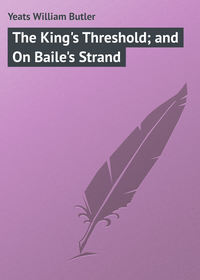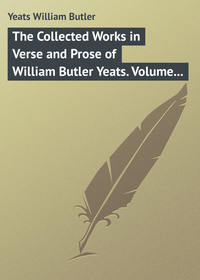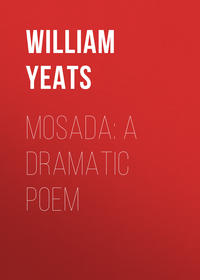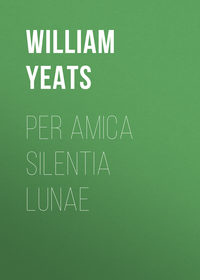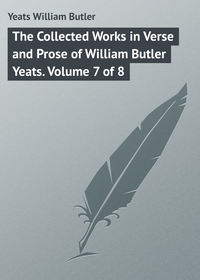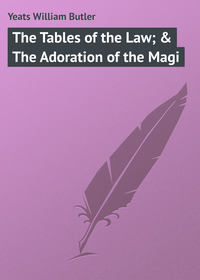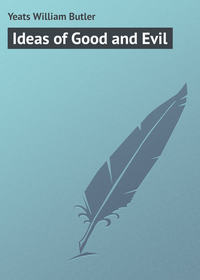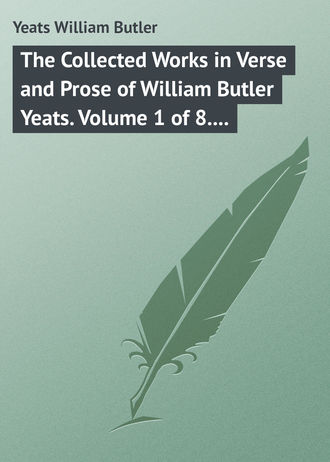 полная версия
полная версияThe Collected Works in Verse and Prose of William Butler Yeats. Volume 1 of 8. Poems Lyrical and Narrative
BAILE AND AILLINN
Argument. Baile and Aillinn were lovers, but Aengus, the Master of Love, wishing them to be happy in his own land among the dead, told to each a story of the other’s death, so that their hearts were broken and they died.
I hardly hear the curlew cry,Nor the grey rush when the wind is high,Before my thoughts begin to runOn the heir of Ulad, Buan’s son,Baile, who had the honey mouth;And that mild woman of the south,Aillinn, who was King Lugaid’s heir.Their love was never drowned in careOf this or that thing, nor grew coldBecause their bodies had grown old.Being forbid to marry on earth,They blossomed to immortal mirth.About the time when Christ was born,When the long wars for the White HornAnd the Brown Bull had not yet come,Young Baile Honey-Mouth, whom someCalled rather Baile Little-Land,Rode out of Emain with a bandOf harpers and young men; and theyImagined, as they struck the wayTo many-pastured Muirthemne,That all things fell out happily,And there, for all that fools had said,Baile and Aillinn would be wed.They found an old man running there:He had ragged long grass-coloured hair;He had knees that stuck out of his hose;He had puddle water in his shoes;He had half a cloak to keep him dry,Although he had a squirrel’s eye.O wandering birds and rushy beds,You put such folly in our headsWith all this crying in the wind;No common love is to our mind,And our poor Kate or Nan is lessThan any whose unhappinessAwoke the harp-strings long ago.Yet they that know all things but knowThat all life had to give us isA child’s laughter, a woman’s kiss.Who was it put so great a scornIn the grey reeds that night and mornAre trodden and broken by the herds,And in the light bodies of birdsThat north wind tumbles to and froAnd pinches among hail and snow?That runner said: ‘I am from the south;I run to Baile Honey-Mouth,To tell him how the girl AillinnRode from the country of her kin,And old and young men rode with her:For all that country had been astirIf anybody half as fairHad chosen a husband anywhereBut where it could see her every day.When they had ridden a little wayAn old man caught the horse’s headWith: “You must home again, and wedWith somebody in your own land.”A young man cried and kissed her hand,“O lady, wed with one of us”;And when no face grew piteousFor any gentle thing she spake,She fell and died of the heart-break.’Because a lover’s heart’s worn out,Being tumbled and blown aboutBy its own blind imagining,And will believe that anythingThat is bad enough to be true, is true,Baile’s heart was broken in two;And he being laid upon green boughs,Was carried to the goodly houseWhere the Hound of Ulad sat beforeThe brazen pillars of his door,His face bowed low to weep the endOf the harper’s daughter and her friend.For although years had passed awayHe always wept them on that day,For on that day they had been betrayed;And now that Honey-Mouth is laidUnder a cairn of sleepy stoneBefore his eyes, he has tears for none,Although he is carrying stone, but twoFor whom the cairn’s but heaped anew.We hold because our memory isSo full of that thing and of thisThat out of sight is out of mind.But the grey rush under the windAnd the grey bird with crooked billHave such long memories, that they stillRemember Deirdre and her man;And when we walk with Kate or NanAbout the windy water side,Our heart can hear the voices chide.How could we be so soon content,Who know the way that Naoise went?And they have news of Deirdre’s eyes,Who being lovely was so wise —Ah! wise, my heart knows well how wise.Now had that old gaunt crafty one,Gathering his cloak about him, runWhere Aillinn rode with waiting maids,Who amid leafy lights and shadesDreamed of the hands that would unlaceTheir bodices in some dim placeWhen they had come to the marriage bed;And harpers, pondering with bowed headA music that had thought enoughOf the ebb of all things to make loveGrow gentle without sorrowings;And leather-coated men with slingsWho peered about on every side;And amid leafy light he cried:‘He is well out of wind and wave;They have heaped the stones above his graveIn Muirthemne, and over itIn changeless Ogham letters writ —Baile, that was of Rury’s seed.‘But the gods long ago decreedNo waiting maid should ever spreadBaile and Aillinn’s marriage bed,For they should clip and clip againWhere wild bees hive on the Great Plain.Therefore it is but little newsThat put this hurry in my shoes.’And hurrying to the south, he cameTo that high hill the herdsmen nameThe Hill Seat of Leighin, becauseSome god or king had made the lawsThat held the land together there,In old times among the clouds of the air.That old man climbed; the day grew dim;Two swans came flying up to him,Linked by a gold chain each to each,And with low murmuring laughing speechAlighted on the windy grass.They knew him: his changed body wasTall, proud and ruddy, and light wingsWere hovering over the harp-stringsThat Etain, Midhir’s wife, had woveIn the hid place, being crazed by love.What shall I call them? fish that swim,Scale rubbing scale where light is dimBy a broad water-lily leaf;Or mice in the one wheaten sheafForgotten at the threshing place;Or birds lost in the one clear spaceOf morning light in a dim sky;Or, it may be, the eyelids of one eye,Or the door pillars of one house,Or two sweet blossoming apple-boughsThat have one shadow on the ground;Or the two strings that made one soundWhere that wise harper’s finger ran.For this young girl and this young manHave happiness without an end,Because they have made so good a friend.They know all wonders, for they passThe towery gates of Gorias,And Findrias and Falias,And long-forgotten Murias,Among the giant kings whose hoard,Cauldron and spear and stone and sword,Was robbed before earth gave the wheat;Wandering from broken street to streetThey come where some huge watcher is,And tremble with their love and kiss.They know undying things, for theyWander where earth withers away,Though nothing troubles the great streamsBut light from the pale stars, and gleamsFrom the holy orchards, where there is noneBut fruit that is of precious stone,Or apples of the sun and moon.What were our praise to them? they eatQuiet’s wild heart, like daily meat;Who when night thickens are afloatOn dappled skins in a glass boat,Far out under a windless sky;While over them birds of Aengus fly,And over the tiller and the prow,And waving white wings to and froAwaken wanderings of light airTo stir their coverlet and their hair.And poets found, old writers say,A yew tree where his body lay;But a wild apple hid the grassWith its sweet blossom where hers was;And being in good heart, becauseA better time had come againAfter the deaths of many men,And that long fighting at the ford,They wrote on tablets of thin board,Made of the apple and the yew,All the love stories that they knew.Let rush and bird cry out their fillOf the harper’s daughter if they will,Beloved, I am not afraid of her.She is not wiser nor lovelier,And you are more high of heart than she,For all her wanderings over-sea;But I’d have bird and rush forgetThose other two; for never yetHas lover lived, but longed to wiveLike them that are no more alive.IN THE SEVEN WOODS
THE ARROW
I thought of your beauty, and this arrow,Made out of a wild thought, is in my marrow.There’s no man may look upon her, no man;As when newly grown to be a woman,Blossom pale, she pulled down the pale blossomAt the moth hour and hid it in her bosom.This beauty’s kinder, yet for a reasonI could weep that the old is out of season.THE FOLLY OF BEING COMFORTED
One that is ever kind said yesterday:‘Your well-beloved’s hair has threads of grey,And little shadows come about her eyes;Time can but make it easier to be wise,Though now it’s hard, till trouble is at an end;And so be patient, be wise and patient, friend.’But, heart, there is no comfort, not a grain;Time can but make her beauty over again,Because of that great nobleness of hers;The fire that stirs about her, when she stirsBurns but more clearly. O she had not these ways,When all the wild summer was in her gaze.O heart! O heart! if she’d but turn her head,You’d know the folly of being comforted.OLD MEMORY
I thought to fly to her when the end of dayAwakens an old memory, and say,‘Your strength, that is so lofty and fierce and kind,It might call up a new age, calling to mindThe queens that were imagined long ago,Is but half yours: he kneaded in the doughThrough the long years of youth, and who would have thoughtIt all, and more than it all, would come to naught,And that dear words meant nothing?’ But enough,For when we have blamed the wind we can blame love;Or, if there needs be more, be nothing saidThat would be harsh for children that have strayed.NEVER GIVE ALL THE HEART
Never give all the heart, for loveWill hardly seem worth thinking ofTo passionate women if it seemCertain, and they never dreamThat it fades out from kiss to kiss;For everything that’s lovely isBut a brief dreamy kind delight.O never give the heart outright,For they, for all smooth lips can say,Have given their hearts up to the play.And who could play it well enoughIf deaf and dumb and blind with love?He that made this knows all the cost,For he gave all his heart and lost.THE WITHERING OF THE BOUGHS
I cried when the moon was murmuring to the birds,‘Let peewit call and curlew cry where they will,I long for your merry and tender and pitiful words,For the roads are unending, and there is no place to my mind.’The honey-pale moon lay low on the sleepy hill,And I fell asleep upon lonely Echtge of streams.No boughs have withered because of the wintry wind;The boughs have withered because I have told them my dreams.I know of the leafy paths that the witches take,Who come with their crowns of pearl and their spindles of wool,And their secret smile, out of the depths of the lake;I know where a dim moon drifts, where the Danaan kindWind and unwind their dances when the light grows coolOn the island lawns, their feet where the pale foam gleams.No boughs have withered because of the wintry wind;The boughs have withered because I have told them my dreams.I know of the sleepy country, where swans fly roundCoupled with golden chains, and sing as they fly.A king and a queen are wandering there, and the soundHas made them so happy and hopeless, so deaf and so blindWith wisdom, they wander till all the years have gone by;I know, and the curlew and peewit on Echtge of streams.No boughs have withered because of the wintry wind;The boughs have withered because I have told them my dreams.ADAM’S CURSE
We sat together at one summer’s end,That beautiful mild woman, your close friend,And you and I, and talked of poetry.I said: ‘A line will take us hours maybe;Yet if it does not seem a moment’s thought,Our stitching and unstitching has been naught.Better go down upon your marrow bonesAnd scrub a kitchen pavement, or break stonesLike an old pauper, in all kinds of weather;For to articulate sweet sounds togetherIs to work harder than all these, and yetBe thought an idler by the noisy setOf bankers, schoolmasters, and clergymenThe martyrs call the world.’That woman thenMurmured with her young voice, for whose mild sakeThere’s many a one shall find out all heartacheIn finding that it’s young and mild and low:‘There is one thing that all we women know,Although we never heard of it at school —That we must labour to be beautiful.’I said: ‘It’s certain there is no fine thingSince Adam’s fall but needs much labouring.There have been lovers who thought love should beSo much compounded of high courtesyThat they would sigh and quote with learned looksPrecedents out of beautiful old books;Yet now it seems an idle trade enough.’We sat grown quiet at the name of love;We saw the last embers of daylight die,And in the trembling blue-green of the skyA moon, worn as if it had been a shellWashed by time’s waters as they rose and fellAbout the stars and broke in days and years.I had a thought for no one’s but your ears;That you were beautiful, and that I stroveTo love you in the old high way of love;That it had all seemed happy, and yet we’d grownAs weary hearted as that hollow moon.RED HANRAHAN’S SONG ABOUT IRELAND
The old brown thorn trees break in two high over Cummen Strand,Under a bitter black wind that blows from the left hand;Our courage breaks like an old tree in a black wind and dies,But we have hidden in our hearts the flame out of the eyesOf Cathleen, the daughter of Houlihan.The wind has bundled up the clouds high over Knocknarea,And thrown the thunder on the stones for all that Maeve can say.Angers that are like noisy clouds have set our hearts abeat;But we have all bent low and low and kissed the quiet feetOf Cathleen, the daughter of Houlihan.The yellow pool has overflowed high up on Clooth-na-Bare,For the wet winds are blowing out of the clinging air;Like heavy flooded waters our bodies and our blood;But purer than a tall candle before the Holy RoodIs Cathleen, the daughter of Houlihan.THE OLD MEN ADMIRING THEMSELVES IN THE WATER
I heard the old, old men say,‘Everything alters,And one by one we drop away.’They had hands like claws, and their kneesWere twisted like the old thorn treesBy the waters.I heard the old, old men say,‘All that’s beautiful drifts awayLike the waters.’UNDER THE MOON
I have no happiness in dreaming of Brycelinde,Nor Avalon the grass-green hollow, nor Joyous Isle,Where one found Lancelot crazed and hid him for a while;Nor Ulad, when Naoise had thrown a sail upon the wind,Nor lands that seem too dim to be burdens on the heart;Land-under-Wave, where out of the moon’s light and the sun’sSeven old sisters wind the threads of the long-lived ones;Land-of-the-Tower, where Aengus has thrown the gates apart,And Wood-of-Wonders, where one kills an ox at dawn,To find it when night falls laid on a golden bier:Therein are many queens like Branwen and Guinivere;And Niamh and Laban and Fand, who could change to an otter or fawn,And the wood-woman, whose lover was changed to a blue-eyed hawk;And whether I go in my dreams by woodland, or dun, or shore,Or on the unpeopled waves with kings to pull at the oar,I hear the harp-string praise them, or hear their mournful talk.Because of a story I heard under the thin hornOf the third moon, that hung between the night and the day,To dream of women whose beauty was folded in dismay,Even in an old story, is a burden not to be borne.THE HOLLOW WOOD
O hurry to the water amid the trees,For there the tall deer and his leman sighWhen they have but looked upon their images,O that none ever loved but you and I!Or have you heard that sliding silver-shoed,Pale silver-proud queen-woman of the sky,When the sun looked out of his golden hood,O that none ever loved but you and I!O hurry to the hollow wood, for thereI will drive out the deer and moon and cry —O my share of the world, O yellow hair,No one has ever loved but you and I!O DO NOT LOVE TOO LONG
Sweetheart, do not love too long:I loved long and long,And grew to be out of fashionLike an old song.All through the years of our youthNeither could have knownTheir own thought from the other’s,We were so much at one.But, O in a minute she changed —O do not love too long,Or you will grow out of fashionLike an old song.THE PLAYERS ASK FOR A BLESSING ON THE PSALTERIES AND ON THEMSELVES
Three voices together:
Hurry to bless the hands that play,The mouths that speak, the notes and strings,O masters of the glittering town!O! lay the shrilly trumpet down,Though drunken with the flags that swayOver the ramparts and the towers,And with the waving of your wings.First voice:
Maybe they linger by the way.One gathers up his purple gown;One leans and mutters by the wall —He dreads the weight of mortal hours.Second voice:
O no, O no! they hurry downLike plovers that have heard the call.Third voice:
O kinsmen of the Three in One,O kinsmen bless the hands that play.The notes they waken shall live onWhen all this heavy history’s done;Our hands, our hands must ebb away.Three voices together:
The proud and careless notes live on,But bless our hands that ebb away.THE HAPPY TOWNLAND
There’s many a strong farmerWhose heart would break in two,If he could see the townlandThat we are riding to;Boughs have their fruit and blossomAt all times of the year;Rivers are running overWith red beer and brown beer.An old man plays the bagpipesIn a golden and silver wood;Queens, their eyes blue like the ice,Are dancing in a crowd.The little fox he murmured,‘O what of the world’s bane?’The sun was laughing sweetly,The moon plucked at my rein;But the little red fox murmured,‘O do not pluck at his rein,He is riding to the townlandThat is the world’s bane.’When their hearts are so highThat they would come to blows,They unhook their heavy swordsFrom golden and silver boughs;But all that are killed in battleAwaken to life again:It is lucky that their storyIs not known among men.For O, the strong farmersThat would let the spade lie,Their hearts would be like a cupThat somebody had drunk dry.The little fox he murmured,‘O what of the world’s bane?’The sun was laughing sweetly,The moon plucked at my rein;But the little red fox murmured,‘O do not pluck at his rein,He is riding to the townlandThat is the world’s bane.’Michael will unhook his trumpetFrom a bough overhead,And blow a little noiseWhen the supper has been spread.Gabriel will come from the waterWith a fish tail, and talkOf wonders that have happenedOn wet roads where men walk,And lift up an old hornOf hammered silver, and drinkTill he has fallen asleepUpon the starry brink.The little fox he murmured,‘O what of the world’s bane?’The sun was laughing sweetly,The moon plucked at my rein;But the little red fox murmured,‘O do not pluck at his rein,He is riding to the townlandThat is the world’s bane.’EARLY POEMS
I
BALLADS AND LYRICS
‘The stars are threshed, and the souls are threshed from their husks.’
William Blake.To A. E.
EARLY POEMS: BALLADS AND LYRICS
THE SONG OF THE HAPPY SHEPHERD
The woods of Arcady are dead,And over is their antique joy;Of old the world on dreaming fed;Gray Truth is now her painted toy;Yet still she turns her restless head:But O, sick children of the world,Of all the many changing thingsIn dreary dancing past us whirled,To the cracked tune that Chronos sings,Words alone are certain good.Where are now the warring kings,Word bemockers? – By the RoodWhere are now the warring kings?An idle word is now their glory,By the stammering schoolboy said,Reading some entangled story:The kings of the old time are fled.The wandering earth herself may beOnly a sudden flaming word,In clanging space a moment heard,Troubling the endless reverie.Then no wise worship dusty deeds,Nor seek – for this is also sooth —To hunger fiercely after truth,Lest all thy toiling only breedsNew dreams, new dreams; there is no truthSaving in thine own heart. Seek, then,No learning from the starry men,Who follow with the optic glassThe whirling ways of stars that pass;Seek, then – for this is also sooth —No word of theirs: the cold star-baneHas cloven and rent their hearts in twain,And dead is all their human truth.Go, gather by the humming seaSome twisted, echo-harbouring shell,And to its lips thy story tell,And they thy comforters will be,Rewording in melodious guileThy fretful words a little while,Till they shall singing fade in ruth,And die a pearly brotherhood;For words alone are certain good:Sing, then, for this is also sooth.I must be gone: there is a graveWhere daffodil and lily wave,And I would please the hapless faun,Buried under the sleepy ground,With mirthful songs before the dawn.His shouting days with mirth were crowned;And still I dream he treads the lawn,Walking ghostly in the dew,Pierced by my glad singing through,My songs of old earth’s dreamy youth:But ah! she dreams not now; dream thou!For fair are poppies on the brow:Dream, dream, for this is also sooth.THE SAD SHEPHERD
There was a man whom Sorrow named his friend,And he, of his high comrade Sorrow dreaming,Went walking with slow steps along the gleamingAnd humming sands, where windy surges wend:And he called loudly to the stars to bendFrom their pale thrones and comfort him, but theyAmong themselves laugh on and sing alway:And then the man whom Sorrow named his friendCried out, Dim sea, hear my most piteous story!The sea swept on and cried her old cry still,Rolling along in dreams from hill to hill;He fled the persecution of her gloryAnd, in a far-off, gentle valley stopping,Cried all his story to the dewdrops glistening,But naught they heard, for they are always listening,The dewdrops, for the sound of their own dropping.And then the man whom Sorrow named his friend,Sought once again the shore, and found a shellAnd thought, I will my heavy story tellTill my own words, re-echoing, shall sendTheir sadness through a hollow, pearly heart;And my own tale again for me shall sing,And my own whispering words be comforting,And lo! my ancient burden may depart.Then he sang softly nigh the pearly rim;But the sad dweller by the sea-ways loneChanged all he sang to inarticulate moanAmong her wildering whirls, forgetting him.THE CLOAK, THE BOAT, AND THE SHOES
‘What do you make so fair and bright?’‘I make the cloak of Sorrow:O, lovely to see in all men’s sightShall be the cloak of Sorrow,In all men’s sight.’‘What do you build with sails for flight?’‘I build a boat for Sorrow,O, swift on the seas all day and nightSaileth the rover Sorrow,All day and night.’‘What do you weave with wool so white?’‘I weave the shoes of Sorrow,Soundless shall be the footfall lightIn all men’s ears of Sorrow,Sudden and light.’ANASHUYA AND VIJAYA
A little Indian temple in the Golden Age. Around it a garden; around that the forest. ANASHUYA, the young priestess, kneeling within the temple.
ANASHUYASend peace on all the lands and flickering corn. —O, may tranquillity walk by his elbowWhen wandering in the forest, if he loveNo other. – Hear, and may the indolent flocksBe plentiful. – And if he love another,May panthers end him. – Hear, and load our kingWith wisdom hour by hour. – May we two stand,When we are dead, beyond the setting suns,A little from the other shades apart,With mingling hair, and play upon one lute.VIJAYA [entering and throwing a lily at her]Hail! hail, my Anashuya.ANASHUYANo: be still.I, priestess of this temple, offer upPrayers for the land.VIJAYAI will wait here, Amrita.ANASHUYABy mighty Brahma’s ever rustling robe,Who is Amrita? Sorrow of all sorrows!Another fills your mind.VIJAYAMy mother’s name.ANASHUYA [sings, coming out of the temple]A sad, sad thought went by me slowly:Sigh, O you little stars! O, sigh and shake your blue apparel!The sad, sad thought has gone from me now wholly:Sing, O you little stars! O sing, and raise your rapturous carolTo mighty Brahma, who has made you many as the sands,And laid you on the gates of evening with his quiet hands.[Sits down on the steps of the temple]Vijaya, I have brought my evening rice;The sun has laid his chin on the gray wood,Weary, with all his poppies gathered round him.VIJAYAThe hour when Kama, full of sleepy laughter,Rises, and showers abroad his fragrant arrows,Piercing the twilight with their murmuring barbs.ANASHUYASee how the sacred old flamingoes come,Painting with shadow all the marble steps:Aged and wise, they seek their wonted perchesWithin the temple, devious walking, madeTo wander by their melancholy minds.Yon tall one eyes my supper; swiftly chase himFar, far away. I named him after you.He is a famous fisher; hour by hourHe ruffles with his bill the minnowed streams.Ah! there he snaps my rice. I told you so.Now cuff him off. He’s off! A kiss for you,Because you saved my rice. Have you no thanks?VIJAYA [sings]Sing you of her, O first few stars,Whom Brahma, touching with his finger, praises, for you holdThe van of wandering quiet; ere you be too calm and old,Sing, turning in your cars,Sing, till you raise your hands and sigh, and from your car heads peer,With all your whirling hair, and drop tear upon azure tear.ANASHUYAWhat know the pilots of the stars of tears?VIJAYATheir faces are all worn, and in their eyesFlashes the fire of sadness, for they seeThe icicles that famish all the north,Where men lie frozen in the glimmering snow;And in the flaming forests cower the lionAnd lioness, with all their whimpering cubs;And, ever pacing on the verge of things,The phantom, Beauty, in a mist of tears;While we alone have round us woven woods,And feel the softness of each other’s hand,Amrita, while —ANASHUYA [going away from him]Ah me, you love another,[Bursting into tears]And may some dreadful ill befall her quick!VIJAYAI loved another; now I love no other.Among the mouldering of ancient woodsYou live, and on the village border she,With her old father the blind wood-cutter;I saw her standing in her door but now.ANASHUYAVijaya, swear to love her never more.VIJAYAAy, ay.ANASHUYASwear by the parents of the gods,Dread oath, who dwell on sacred Himalay,On the far Golden Peak; enormous shapes,Who still were old when the great sea was young;On their vast faces mystery and dreams;Their hair along the mountains rolled and filledFrom year to year by the unnumbered nestsOf aweless birds, and round their stirless feetThe joyous flocks of deer and antelope,Who never hear the unforgiving hound.Swear!VIJAYABy the parents of the gods, I swear.ANASHUYA [sings]I have forgiven, O new star!Maybe you have not heard of us, you have come forth so newly,You hunter of the fields afar!Ah, you will know my loved one by his hunter’s arrows truly,Shoot on him shafts of quietness, that he may ever keepAn inner laughter, and may kiss his hands to me in sleep.Farewell, Vijaya. Nay, no word, no word;I, priestess of this temple, offer upPrayers for the land.[VIJAYA goes]O Brahma, guard in sleepThe merry lambs and the complacent kine,The flies below the leaves, and the young miceIn the tree roots, and all the sacred flocksOf red flamingo; and my love, Vijaya;And may no restless fay with fidget fingerTrouble his sleeping: give him dreams of me.

